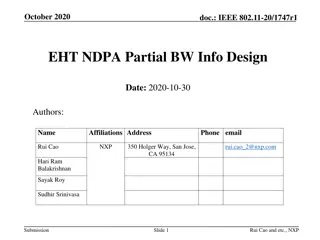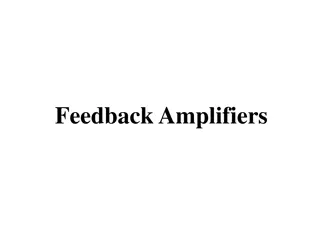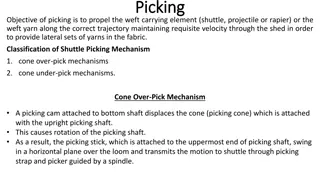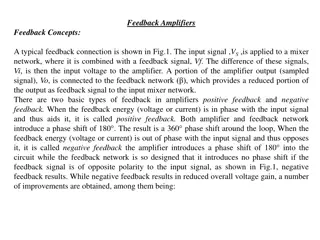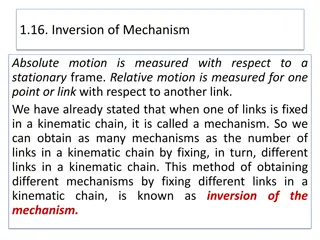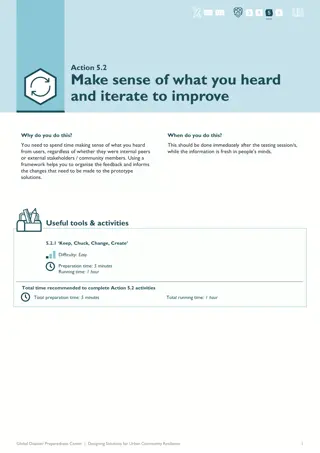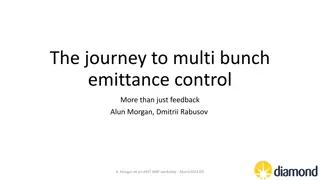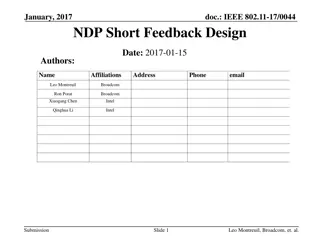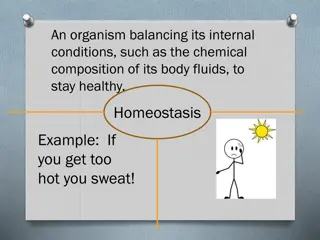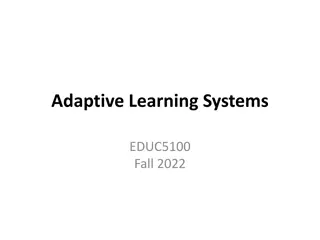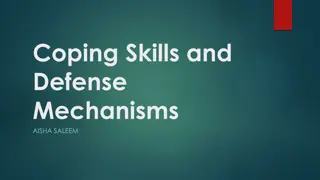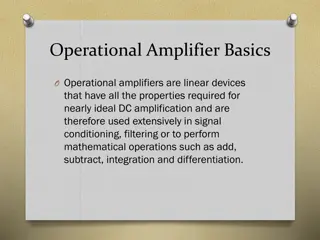Enhancing Student Learning Through Effective Feedback Strategies
Effective feedback plays a crucial role in improving student learning outcomes by providing specific information that students can use to enhance their performance. This content explores the importance of feedback, examples of good feedback practices, qualities of good feedback, and what components
5 views • 16 slides
Advancements in Chemical Mechanisms for Air Quality Management
Daniel Jacob and team have been enhancing chemical mechanisms in the GEOS-Chem model to support US air quality management. Ongoing work includes developing new mechanisms for aromatic VOCs, tropospheric halogens, mercury redox, adaptive mechanism reduction, machine learning applications, and unifica
0 views • 19 slides
Understanding Plasmid Partitioning Mechanisms in Bacteria
The stable maintenance of low-copy-number plasmids in bacteria relies on partition mechanisms that ensure proper positioning during cell division. Different from high-copy-number plasmids, which rely on random diffusion, low-copy-number plasmids require regulated partitioning mechanisms to prevent d
0 views • 14 slides
Design Considerations for Partial Bandwidth Information in IEEE 802.11-20/1747r1
Design considerations for partial bandwidth information in the IEEE 802.11-20/1747r1 standard are discussed, focusing on EHT NDPA frame structure, feedback mechanisms, bitmap design, and table-based designs to support large RU/MRUs. The feedback mechanism utilizes bitmap resolution signals, providin
1 views • 10 slides
Effective Feedback Strategies for Learning Enhancement
Feedback plays a crucial role in the learning process. This session focuses on strategies for providing effective feedback to improve learning outcomes, course, and assignment design, best practices, and tools for efficient feedback delivery. Understanding the importance of prompt feedback and diffe
3 views • 20 slides
Understanding Feedback Amplifiers: Structure, Properties, and Topologies
Electronic circuits rely heavily on feedback mechanisms, particularly negative feedback, for various purposes such as desensitizing gain, reducing distortion, controlling impedance, and improving amplifier bandwidth. This article explores the general structure of feedback, properties of negative fee
0 views • 68 slides
Understanding Shuttle Picking Mechanisms in Weaving
Shuttle picking mechanisms play a crucial role in propelling the weft carrying element to maintain the required trajectory and velocity in fabric weaving. Two common mechanisms are cone over-pick and cone under-pick, each offering unique adjustments for strength and timing. The cone over-pick involv
0 views • 14 slides
Enhancing Feedback Practices with Audio-Visual Technology: A Study on Student Satisfaction and Attainment
This presentation delves into the implementation of Audio-Visual Feedback (AVF) technology to improve assessment feedback practices in an educational institution. The study explores the impact of AVF on student satisfaction levels compared to traditional written feedback, as well as its influence on
0 views • 21 slides
Understanding the Importance of Feedback in Achievement Enhancement
Feedback plays a crucial role in encouraging or discouraging behavior, making it essential to provide constructive feedback that focuses on growth and improvement. Improper feedback can lead to incompetence in the workplace. Learn about the definition of feedback, how to give feedback effectively, a
2 views • 22 slides
Understanding Feedback Amplifiers in Electronic Circuits
Feedback amplifiers play a crucial role in electronic circuits by providing mechanisms for controlling gain, stability, and overall performance. There are two basic types of feedback - positive and negative, each offering distinct advantages. The four ways of connecting feedback signals involve volt
0 views • 18 slides
University Partnership Forum 2018: Survey Results & Feedback Analysis
The UK's European University Partnership Forum 2018 presents survey findings from the Partner Institution Survey 2016/17 conducted by Matthew Redmond. The survey aims to gather direct feedback from partner students on teaching, assessment, support, resources, and personal development. It highlights
0 views • 18 slides
Understanding the Inversion of Mechanisms in Kinematics
Inversion of Mechanisms in Kinematics involves measuring absolute and relative motions in stationary and moving frames, respectively. By fixing different links in a kinematic chain, we can obtain various mechanisms. This process does not alter relative motions but may significantly change absolute m
0 views • 78 slides
Enhancing Feedback Strategies in ELA Learning Project Day
Refine understanding of ELA, engage with student exemplars, and design constructive feedback in a structured agenda. Activities include generating feedback, digging deeper into feedback processes, and considering the impact of timely and specific feedback on student growth in learning and skills. Co
0 views • 31 slides
Effective Feedback Strategies for Resident Teachers
Effective feedback is critical for the growth of resident teachers. This guide covers types of feedback, why it's important, what makes feedback effective, behaviorally anchored rating scales, models for giving feedback, and key tips for delivering feedback successfully.
0 views • 14 slides
Effective Feedback Strategies for High Performance
Feedback plays a crucial role in helping individuals improve performance and reach their full potential. From providing helpful feedback to reinforcing desired behaviors, this guide explores various strategies, including redirection, reinforcement, and F.A.S.T. feedback, to enhance workplace perform
0 views • 21 slides
Enhancing Postgraduate Academic Writing: Feedback Collaboration Model
Developing a collaborative model for postgraduate academic writing courses involves understanding the role of feedback, focusing on content feedback, and exploring the intersections between discipline specialist and writing tutor feedback to improve academic writing abilities. Feedback offers valuab
1 views • 27 slides
Safeguarding Focal Point Training: Enhancing Reporting and Response Mechanisms
This training module focuses on empowering Safeguarding Focal Points (SFPs) to understand and implement community-based feedback and response mechanisms, effectively handle safeguarding complaints, document barriers to reporting, address data protection issues, and ensure inclusive and confidential
0 views • 18 slides
Iterative Feedback Framework for Prototype Improvement
The iterative feedback framework involves making sense of user feedback using the Keep, Chuck, Change, Create (KCCC) model to iterate and enhance prototype solutions. This process helps organize input from testing sessions, informing necessary modifications for better outcomes. The framework emphasi
1 views • 26 slides
Understanding Authentication Mechanisms and Security Vulnerabilities
Authentication lies at the core of application security, serving as the primary defense against malicious attacks. This article explores various authentication technologies, including HTML forms-based authentication, multi-factor mechanisms, client SSL certificates, and more. It delves into common d
0 views • 70 slides
Enhancing Emittance Control Strategies in Particle Accelerators
The journey to multi-bunch emittance control goes beyond mere feedback mechanisms, involving nuances like pinhole cameras as detectors and skew quadrupole magnets as actuators. This innovative approach aims to overcome limitations of existing systems like coupling control issues and hysteresis perfo
0 views • 16 slides
Understanding Mid-Course Feedback Using Qualtrics
Mid-Course Feedback (MCF) is a valuable process that allows students to provide feedback on their courses mid-semester, impacting teaching strategies, communication, materials, and more. This feedback benefits both students and instructors by improving teaching effectiveness, student satisfaction, a
0 views • 21 slides
Importance of Student and Staff Feedback in Educator Evaluation
Student and staff feedback plays a crucial role in educator evaluation, providing valuable insights into areas of strength and growth. Informed by evidence such as surveys, observations, and artifacts, feedback helps educators tailor their practice, fostering two-way communication and professional d
0 views • 14 slides
Understanding Cascade Control Systems in Industrial Processes
Cascade control systems play a crucial role in improving process control efficiency by incorporating feedback loops within feedback loops. This type of control architecture helps to better handle disturbances and variations in the process by creating secondary loops that monitor specific parameters.
0 views • 8 slides
IEEE 802.11-17/0044 NDP Short Feedback Design
The document discusses the need for short simultaneous feedback from multiple STAs in IEEE 802.11 systems for improved efficiency. It introduces the NDP feedback mechanism and proposes a signaling technique to efficiently collect feedback from a high number of STAs. The mechanism involves UL MU tran
0 views • 19 slides
AI Automation for Corrective Feedback in Language Learning
Exploring the utilization of AI technology to automate and enhance corrective feedback in language learning, addressing challenges such as time constraints, delayed feedback, and student comprehension. Introduction of a new AI text tool by Marcus Green for accessible and effective feedback provision
0 views • 13 slides
Enhancing Beneficiary Feedback Mechanism in Somalia Return Consortium
The Somalia Return Consortium aims to support internally displaced Somalis in voluntary returns to their areas of origin. Through a robust Feedback System, beneficiaries can voice their concerns and provide direct feedback, enhancing accountability and transparency. Strengths include well-resourced
0 views • 9 slides
Enhancing Research Appointment Services at UMBC Library
UMBC subject librarians implemented a feedback survey to improve research appointment services. By analyzing feedback data, shared best practices were developed to ensure quality and consistency. The project timeline included identifying goals, drafting the timeline, creating the feedback form, and
0 views • 7 slides
Overview of Human Rights Monitoring Mechanisms
Human rights conventions under the United Nations and regional systems have established monitoring mechanisms to ensure compliance. These mechanisms include treaty-based and non-treaty-based approaches, with treaty bodies overseeing the implementation of legally binding instruments. Reporting proced
0 views • 23 slides
Understanding the Importance of Feedback in Learning and Development
Feedback plays a crucial role in providing information about performance or behavior to affirm strengths and improve weaknesses. It helps individuals become consciously competent by identifying areas for improvement through formative assessment. Effective feedback enhances motivation, promotes learn
0 views • 33 slides
IEEE 802.11-19/0709r0 - Immediate and Delayed Feedback May 2019
The document discusses immediate and delayed feedback mechanisms in IEEE 802.11-19/0709r0, focusing on parameters, feedback types, and ranging options. It explores variations in feedback direction and types, proposing options for phase shift feedback and distinguishing between RSTA-to-ISTA and ISTA-
0 views • 6 slides
Understanding the Regulation of Hormone Secretion and Feedback Mechanisms
Hormone secretion is tightly regulated to prevent overproduction or underproduction. It involves various factors such as nervous system signals, chemical changes in the blood, and feedback mechanisms. Hormones play a vital role in maintaining homeostasis by acting on target cells and eliciting speci
0 views • 17 slides
Understanding Biological Responses: Homeostasis, Stimuli, and Feedback Mechanisms
Explore the concepts of homeostasis, stimuli, and feedback mechanisms in biological systems. Learn how organisms maintain internal balance, respond to internal and external stimuli, and regulate bodily functions through feedback processes. Discover examples of responses such as sweating when hot, sq
0 views • 10 slides
Understanding Biomarkers and Toxicity Mechanisms: Overview of Mechanisms in Targeting Biological Macromolecules
This overview delves into different categorizations of mechanisms of action (MoA) based on target molecules, interaction types, and steric specificity. It explores non-specific and specific mechanisms, along with possible categorizations involving membrane toxicity, reactive toxicity, and species-sp
0 views • 8 slides
Feedback Analysis on Medication Incident Reporting in Hospitals
Feedback received from IMSN members on NIMS and incident reporting revealed various issues affecting the rates at which staff report medication incidents/near misses within hospitals. Major themes included staffing numbers and turnover, pharmacist involvement in incident reporting, clinical pharmacy
0 views • 12 slides
Product Feedback Forum at NWS: Provisional PS-PVR User Feedback on ABI, CMI, and L1b
A comprehensive feedback system managed by PRO at NWS, focusing on user input for GOES-R products such as ABI, CMI, and L1b. The forum gathers feedback through surveys and weekly calls, addressing product quality issues and ensuring effective communication with field sites. Noteworthy discussions in
0 views • 18 slides
Understanding Feedback in Learning Systems
Exploring the role of feedback in educational settings, this content delves into the concept of providing information to learners by various agents. It discusses the importance of feedback in guiding learning progress, highlighting examples of correctness feedback and correct answer feedback. The be
0 views • 66 slides
Understanding Coping Skills and Defense Mechanisms
Coping mechanisms and defense mechanisms are strategies individuals use to manage stress and emotions. Coping mechanisms help people adjust to difficult events while maintaining emotional well-being, whereas defense mechanisms operate at an unconscious level and can change internal psychological sta
0 views • 18 slides
Defense Mechanisms in Psychology: Understanding Repression, Displacement, Intellectualization, Rationalization
Defense mechanisms play a crucial role in how individuals cope with stress and anxiety. This text delves into key defense mechanisms such as repression, displacement, intellectualization, and rationalization. These mechanisms help individuals manage unacceptable thoughts, feelings, and impulses by r
0 views • 11 slides
Understanding Operational Amplifiers: Basics and Feedback Mechanisms
Operational amplifiers are versatile linear devices used for amplification, signal processing, and mathematical operations. They consist of high-impedance inputs and an output port, enabling various functions such as addition, subtraction, and differentiation. Incorporating feedback mechanisms like
0 views • 6 slides
Feedback and Mentoring Workshop for HIV Researchers
Mentoring workshop for HIV researchers focusing on giving and receiving feedback, nurturing early career investigators, and working with faculty continuum. The workshop offers insights on feedback exercises, assumptions, and rhetorical questions about feedback. Participants are encouraged to reflect
0 views • 33 slides



